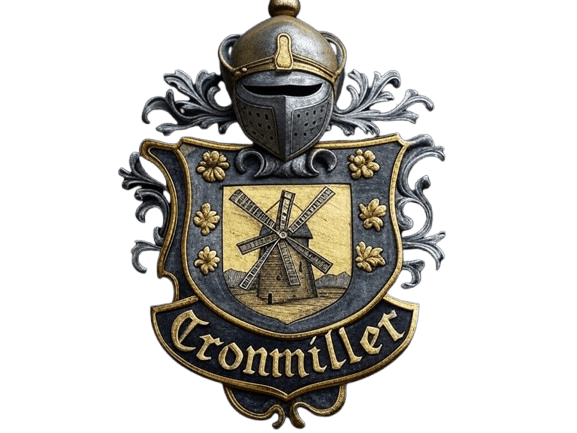
The Cronmiller Name: Origins and History
Overview of the Surname
Like many surnames of Germanic origin, Cronmiller (also found as Cronemiller,Kronmüller, Kronmiller, Gronmüller, etc.) likely began as a descriptive or occupational surname. In German, the word Müller (spelled Mueller or Mullerin anglicized form) simply means "miller"—i.e., one who operates or works at a mill.
Over time, families bearing the name might have spelled it according to local dialects, regional orthography, or later Anglicization (especially after immigration to the United States). The variation in prefixes (Cron–, Kron–, Gron–) suggests either a dialect or an earlier form that shifted over centuries.
Origins of the Name
Occupational Origin: Müller ("Miller")
- The core of all these variants is Müller, Germany's most common surname.
- In the Middle Ages (1300s–1500s), as surnames became standardized, many families took or were given the name indicating their trade.
- Thus, Müller lines can often be traced in local parish or civic records back to the 15th or 16th centuries (and in rare cases, earlier).
The Prefix Variations
Kron– or Cron– from "Krone" (Crown)
The German word Krone means "crown." A family might have adopted (or been assigned)Kron-Müller to denote "the miller by the crown" (perhaps referring to a mill located near an inn called Zur Krone ["At the Crown"] or near a place whose emblem was a crown).
Korn– vs. Kron–
In some dialects, Korn ("grain") and Kron ("crown") can sound similar. One hypothesis is that Cron– might be an older or dialect spelling of Korn, leading to "grain miller."
Gron– Variation
Sometimes "Gron–" might derive from grün (green) in dialect, or from a toponym (e.g., Gronau, Gronigen, etc.).
Historical Timeline
Medieval Roots and the Evolution of Surnames
13th–15th Centuries: While many families in German-speaking lands adopted surnames in the late Middle Ages (1300s–1400s), some localities or social groups began doing so slightly earlier or later. Occupational names (like Müller) were among the most widespread because many people were designated by their trade or craft.
15th–16th Centuries: Regional dialects and inconsistent spelling conventions caused variations such as Kronmüller, Cronmüller, or Gronmüller. These variations might reflect the place a family lived (for instance, near a mill called Krone, "crown") or the preference of local scribes who wrote the name as they heard it.
Early Modern Period Developments
16th–17th Centuries: Central Europe, especially the Holy Roman Empire, was fragmented into numerous states and principalities. Record-keeping varied from region to region. Church registers (baptism, marriage, burial) began in some areas in the 1500s or early 1600s—this can be a key time to find your family name in written form.
Wars (like the Thirty Years' War, 1618–1648) devastated large parts of Germany and sometimes forced families to relocate, which could lead to new name variants in new regions.
Guilds and Milling: Millers often belonged to trade guilds, which kept member records. These guild documents (where surviving) can date back to the 1500s or 1600s. You might see Kronmüller/Cronmüller in guild rosters or tax rolls.
Migration to America: 1700s–1800s
18th Century (1700s): Significant waves of German-speaking immigrants—often called "Palatines" generically—arrived in British North America. Pennsylvania, and specifically Philadelphia, was the main entry point for many. The Pennsylvania "Dutch" (a corruption of "Deutsch") community included immigrants from other German states.
Names were often written down by port officials and thus became "frozen" in Anglicized forms—e.g., Kronmüller to Cronmiller or Crownmiller.
19th Century (1800s): Economic hardship, political upheaval, and cheap land in the U.S. encouraged migration, solidifying "Cronmiller" as a durable form of the name in records.
Modern Era
20th Century to Present: More uniform record-keeping introduced in the 19th and early 20th centuries made the name consistently spelled within local and family lines.
Are You a Cronmiller?
If you share this surname or have information about its history, we'd love to hear from you. Your story could help us better understand the rich history of the Cronmiller name.
Drop us a line at hello@cronmiller.net